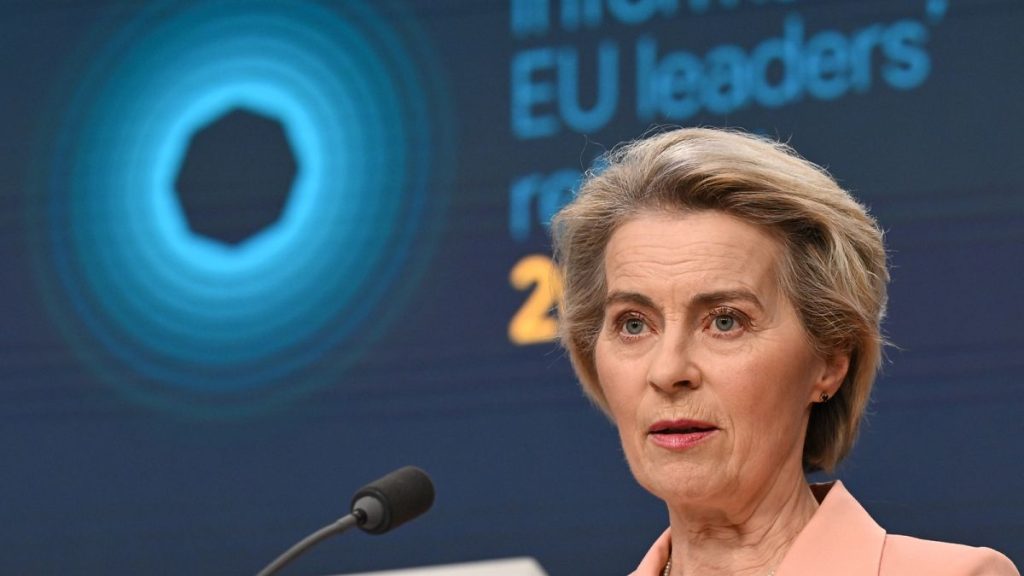The European Union stands poised to engage in potentially arduous trade negotiations with the United States, following recent pronouncements by former US President Donald Trump regarding the imposition of tariffs on European goods. European Commission President Ursula von der Leyen, while emphasizing the EU’s commitment to finding common ground, has made it clear that the bloc will resolutely defend its interests. This stance comes in the wake of agreements reached between the US, Canada, and Mexico, in which tariffs were temporarily averted in exchange for commitments on border security and combating illicit activities. These agreements underscore Trump’s apparent strategy of leveraging tariffs as a tool to extract concessions from allies, rather than solely for economic rebalancing.
The transatlantic trade relationship, a cornerstone of the global economy, is now fraught with uncertainty. Trump’s criticism of the EU’s trade practices, particularly the long-standing surplus in goods trade with the US, ignores the substantial EU deficit in services trade. His focus on automobiles and agricultural products overlooks the broader economic interplay between the two regions. The EU, represented by the European Commission in trade matters, faces the challenge of navigating these complex dynamics while safeguarding its own economic interests. Von der Leyen has stressed the importance of finding common ground with the US, highlighting areas of mutual interest such as critical supply chains and emerging technologies. However, she has also signaled the EU’s preparedness to retaliate if necessary, though specific sectors for potential counter-tariffs have not been identified.
The economic stakes are undeniably high. The EU and US together account for a significant portion of global trade and GDP, with millions of jobs on both sides of the Atlantic dependent on the transatlantic partnership. The potential disruption caused by a trade war would have far-reaching consequences, impacting businesses, industries, and ultimately, citizens. Von der Leyen’s emphasis on the economic interdependence underscores the importance of finding a mutually beneficial solution. The EU’s approach appears to be one of cautious pragmatism, seeking to balance the need for dialogue and cooperation with the imperative of protecting its interests in a volatile global landscape.
Beyond the immediate trade tensions with the US, Von der Leyen has emphasized the need for the EU to adopt a more agile and assertive foreign policy posture. The current geopolitical environment, characterized by rising authoritarianism, technological disruption, and climate change, necessitates a strategic shift away from outdated paradigms. She has called for a more pragmatic approach, grounded in calculated assessments of the EU’s interests rather than sentimentality or nostalgia for a bygone era. This forward-looking perspective recognizes the complex and multifaceted challenges facing the EU in the 21st century.
The EU’s relationship with China also presents a significant challenge. While recognizing the potential for expanding trade and investment ties, Von der Leyen acknowledges the need to address existing friction points. This nuanced approach reflects the EU’s recognition of China’s growing economic power while also acknowledging the inherent complexities of engaging with a country that does not necessarily share the EU’s values and democratic principles. The EU seeks to navigate this delicate balancing act by pursuing a strategy that promotes cooperation where possible while simultaneously safeguarding its own interests.
In essence, the EU finds itself at a critical juncture in its foreign policy. The trade dispute with the US demands immediate attention, requiring a delicate balance of diplomacy and firmness. Simultaneously, the EU must adapt its broader foreign policy approach to the realities of a rapidly changing global landscape. Von der Leyen’s call for a more pragmatic and assertive stance reflects the EU’s recognition of the need to navigate a world characterized by increased competition, geopolitical tensions, and emerging challenges. The EU’s success in navigating these complex dynamics will be crucial for its future prosperity and security.










